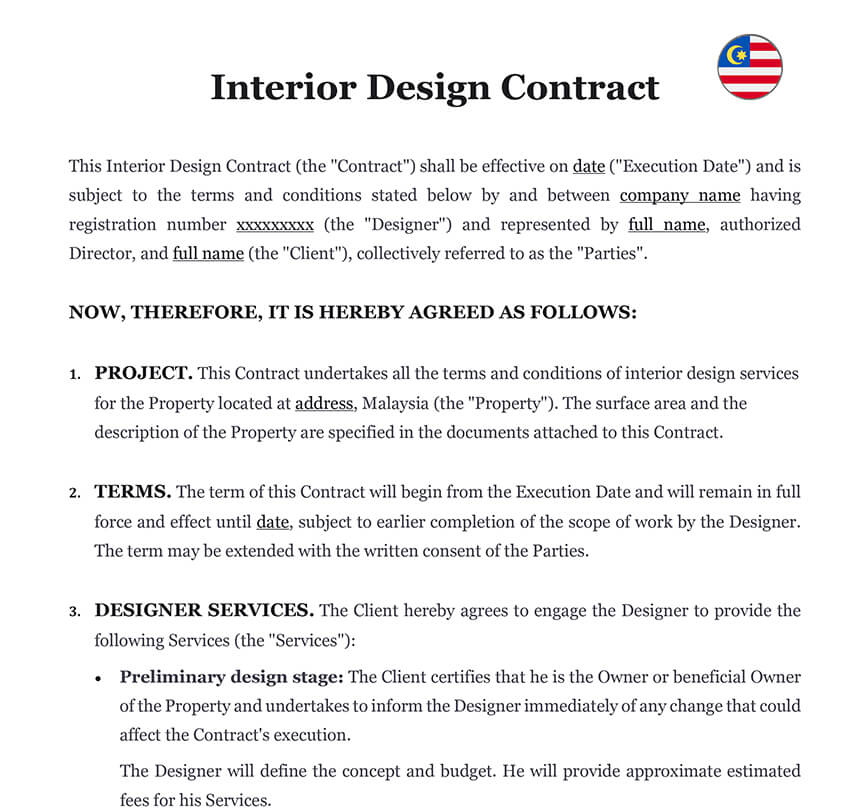Ready to use legal template
Drafted by experienced lawyers
Chinese-English translation
Ready to use legal template
Drafted by lawyers
Chinese-English translation
Home › Buy a property › Interior design contract
Learn more about Interior Design Contract in China
An Interior Design Contract is a legally binding agreement between a client and an interior designer, outlining the scope of work, project timeline, payment terms, and responsibilities of both parties. This contract ensures clear communication, minimizes disputes, and protects the interests of both the designer and the client. Whether you are a business, property owner, or interior designer, having a professionally drafted contract helps prevent misunderstandings and ensures smooth project execution. At Themis Partner, our Interior Design Contract is easy to edit in Word format and drafted by experienced lawyers in English and Mandarin, making it adaptable to your specific needs. Download it today to secure your interior design project with a clear, legally sound agreement.
Table of contents
-
What is an Interior Design Contract in China?
-
What is included in this Interior Design Contract?
-
Why do I need an Interior Design Contract in China?
-
What is the role of an Interior Designer in a contract?
-
What are the payment schedules in an Interior Design Contract?
-
Can an Interior Design Contract protect my intellectual property?
-
Can an Interior Design Contract cover project revisions?
-
How to handle project delays in an Interior Design Contract?
-
Is an Interior Design Contract legally binding in China?
What is an Interior Design Contract in China?
An Interior Design Contract in China is a formal, legally binding agreement between a client and an interior designer that outlines the specific terms, conditions, and responsibilities for an interior design project. This contract serves to define the scope of work, project timelines, payment terms, and the respective obligations of both the designer and the client. It helps to ensure that both parties are aligned on expectations, project deliverables, and legal compliance. In China, having a well-drafted contract is particularly crucial because it helps ensure adherence to local regulations, such as those regarding property, construction, and intellectual property rights.
Furthermore, the contract provides protection for both the client and designer by minimizing potential disputes and clarifying procedures for project revisions, cancellations, and other contingencies. With clear terms, the contract facilitates smooth project execution, protects intellectual property, and ensures that the project adheres to Chinese legal standards.For further details on China’s interior design and construction laws, refer to China’s National Development and Reform Commission (NDRC)
Why use an Interior Design Contract?
| ➤ Project: Defines the scope of Interior Design services, specifying the Property’s address, surface area, and attached documents. |
| ➤ Terms: Outlines the contract’s duration from the Execution Date and conditions for extensions with mutual consent. |
| ➤ Designer Services: Covers all project stages, from preliminary design to furnishing, decoration, and supervision. |
| ➤ Designer Fees: Specifies payment terms, including non-refundable advance payments and balances upon completion. |
| ➤ Reimbursement and Expenses: Client reimburses additional costs, including out-of-pocket and extra expenses. |
| ➤ Services Changes: Establishes fees for design modifications requested after approval and their impact on timelines. |
| ➤ Client Liability: Client ensures timely permits, accurate information, and indemnifies the Designer from third-party claims. |
| ➤ Designer Liability: Limits Designer’s liability to fees paid, covering damages from design errors or omissions. |
| ➤ Non-Disclosure: Ensures confidentiality of design materials, drawings, and intellectual property during and after the contract. |
| ➤ Termination: Defines termination conditions due to breaches, with a specified notice period. |
| ➤ Intellectual Property Rights: Designer retains ownership of all intellectual property created during the project. |
| ➤ Force Majeure: Excuses obligations if hindered by external factors like natural disasters or legal changes. |
| ➤ Entire Agreement: Confirms that the contract supersedes any prior discussions or agreements. |
| ➤ Governing Law and Jurisdiction: The contract follows Chinese law, with disputes resolved in Chinese courts. |
| ➤ Documents Attached: Lists required documentation from both parties, ensuring contract validity. |
Why do I need an Interior Design Contract in China?
1. Clear Expectations and Legal Protection
An Interior Design Contract is essential in China for setting clear expectations between the client and designer. By defining the scope of work, payment terms, and responsibilities of both parties, the contract helps avoid misunderstandings and ensures that both sides are on the same page.
2. Compliance with Local Regulations
The contract also ensures compliance with Chinese laws and regulations. These laws cover various aspects such as intellectual property rights, construction regulations, and taxation, which are crucial to prevent any legal issues during the project. Without a legally binding contract, both parties may face unexpected challenges, fines, or delays due to non-compliance.
3. Risk Minimization
A well-structured contract reduces risks associated with miscommunication or failure to meet deadlines. It outlines the project’s timeline, fees, and how disputes will be handled, ensuring that both parties are prepared for any challenges that arise during the project.
For further guidance on Chinese intellectual property rights, check out China National Intellectual Property Administration (CNIPA).
🔗 Download our Architect Contract to formalize architectural planning, structural design, and compliance, ideal for projects requiring more than just interior design.
What is the role of an Interior Designer in a contract?
1. Design Expertise and Execution
The primary role of an interior designer in the contract is to provide professional design services based on the client’s needs and project requirements. This involves creating the overall design concept, selecting materials, and ensuring the space is functional and aesthetically appealing.
2. Client Communication and Approvals
The designer must maintain communication with the client throughout the project, presenting design ideas, providing updates, and receiving feedback. Any adjustments or revisions to the design are made based on client input, ensuring the final result aligns with the client’s vision.
3. Adherence to Regulations
The designer also ensures that the project complies with all local building codes, safety regulations, and zoning laws. This is particularly important in a complex regulatory environment like China, where construction and design laws can be stringent.
🔗 Download our Construction Contract to define the full scope of building work, including materials, timelines, and responsibilities, separate from design-only agreements.
What are the payment schedules in an Interior Design Contract?
| ➤ Advance Payments: An initial payment covers consultations, design drafts, and research, ensuring the designer is compensated upfront. |
| ➤ Milestone Payments: Payments are divided into installments based on project milestones, such as preliminary design completion and material delivery. |
| ➤ Final Payment: The last payment is made upon project completion, after the client approves all design elements and revisions. |
| ➤ Reimbursement of Expenses: The client reimburses out-of-pocket expenses for materials, travel, or third-party costs as specified in the contract. |
- Remarks:
The architect’s role in the contract is to provide professional services that meet the client’s needs and the project’s specifications. This includes creating the overall design, selecting materials, ensuring the project complies with local regulations, and managing the project from the conceptual phase through to construction.
Can an Interior Design Contract protect my intellectual property?
1. Ownership of Design Work
Yes, an Interior Design Contract is an important tool for protecting intellectual property. Generally, the designer retains ownership of the designs they create during the project, which can include drawings, concepts, and plans. The contract outlines the conditions under which the client may use the designs.
2. Non-Disclosure Clauses
The contract typically includes a non-disclosure clause to protect the confidentiality of the designer’s intellectual property. This prevents the client from sharing or using the design without permission, ensuring that the designer’s creative work is protected from unauthorized use or reproduction.
3. Licensing Rights
The contract may grant the client a limited license to use the design for a specific purpose, such as for the duration of the project. If the client wishes to own the design outright, they would typically need to negotiate an additional agreement or pay extra compensation to the designer for the transfer of ownership.
4. Protection against Infringement
The contract should also specify the consequences of intellectual property infringement. If the client uses the design without the designer’s consent, the designer can seek legal remedies under Chinese law to enforce their rights.
Can an Interior Design Contract cover project revisions?
1. Scope of Revisions
Yes, an Interior Design Contract can cover revisions to the design. It’s common for the client to request changes after the initial design has been approved. The contract should outline how these revisions will be handled, including whether additional fees will apply and how the schedule may be affected.
2. Additional Costs
The contract typically specifies that the client will be responsible for any costs associated with changes to the design after it has been finalized. These costs could include additional work by the designer, changes to materials, or adjustments in construction plans.
3. Timeline Adjustments
Revisions may also require adjustments to the project timeline. The contract should detail how delays caused by changes will be managed, including new deadlines and the possibility of extending the project completion date.
How to handle project delays in an Interior Design Contract?
1. Force Majeure Clause
Delays are sometimes unavoidable due to external factors such as natural disasters, supply chain disruptions, or changes in legal regulations. A force majeure clause in the contract addresses such delays, excusing either party from responsibility for non-performance due to events outside their control.
2. Communication and Notice of Delay
If a delay occurs, the party affected should notify the other party in writing as soon as possible. The contract should specify a reasonable notice period, allowing both parties to adjust expectations and make necessary changes to the project timeline.
Is an Interior Design Contract legally binding in China?
In China, an Interior Design Contract is legally binding as long as it meets specific criteria. Below are the key elements that contribute to its enforceability:
| ➤ Contract Signature: A contract signed by both parties is legally binding in China. |
| ➤ Presence of Witnesses or Notary: While not mandatory, having witnesses or notarization can strengthen the contract's validity. |
| ➤ Compliance with Local Laws: The contract must adhere to Chinese laws on property, contracts, and intellectual property protection. |
| ➤ Formal Agreement in Writing: To be legally enforceable, all terms must be clearly outlined in a written agreement. |
For more information about contract laws in China, visit China’s Ministry of Justice.
Conclusion: Why does Interior Design Contracts matter in China?
An Interior Design Contract is a vital tool for ensuring the success of a design project in China. By clearly defining the scope of work, payment schedules, intellectual property rights, and dispute resolution methods, it protects both the client and the designer throughout the project. It is highly recommended to have such a contract in place to safeguard your interests and ensure compliance with local laws. For more information and to download a customizable Interior Design Contract, please visit Themis Partner.
Interior Design ContractTemplate (.docx)
Save on attorney fees
310 client reviews (4.8/5) ⭐⭐⭐⭐⭐
Share information
Why Themis Partner ?
Make documents forhundreds of purposes
Hundreds of documents
Instant access to our entire library of documents for China.
24/7 legal support
Free legal advice from our network of qualified lawyers.
Easily customized
Editable Word documents, unlimited revisions and copies.
Legal and Reliable
Documents written by lawyers that you can use with confidence.




